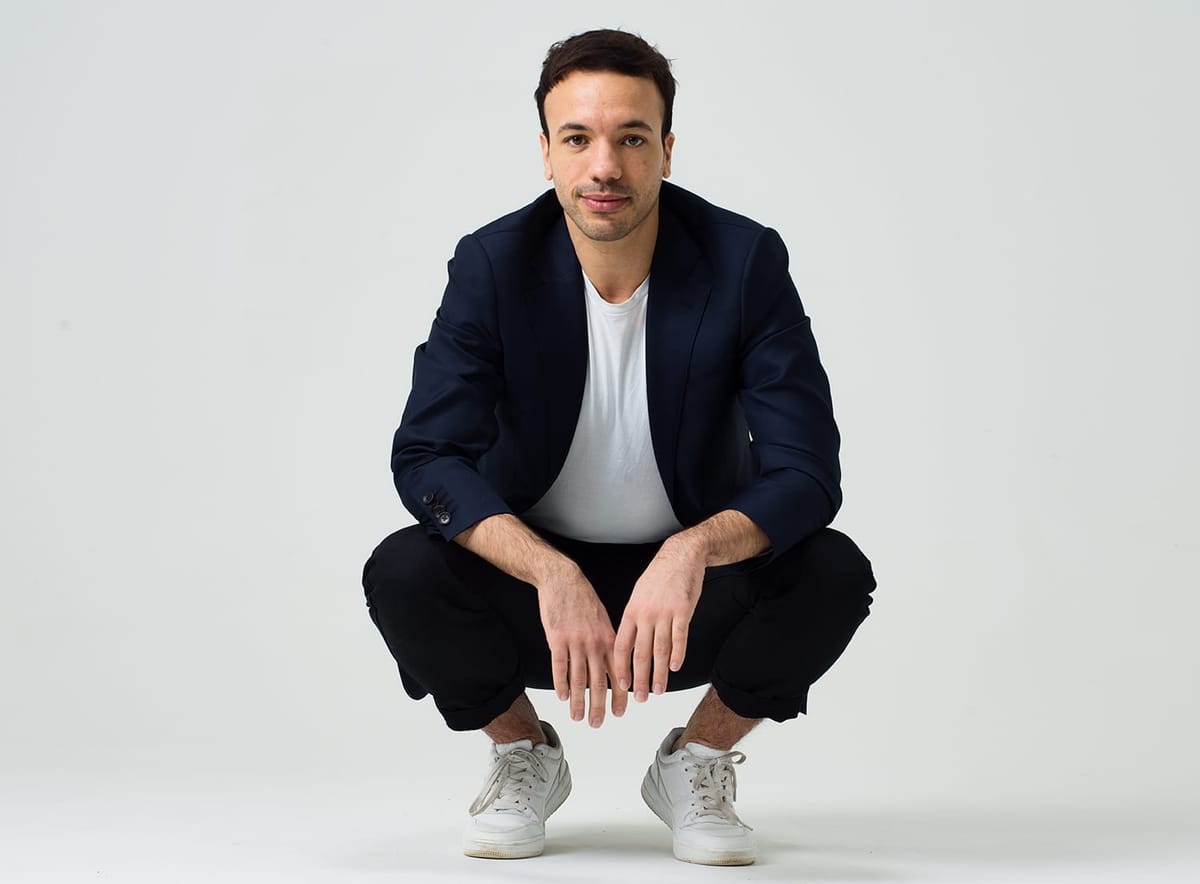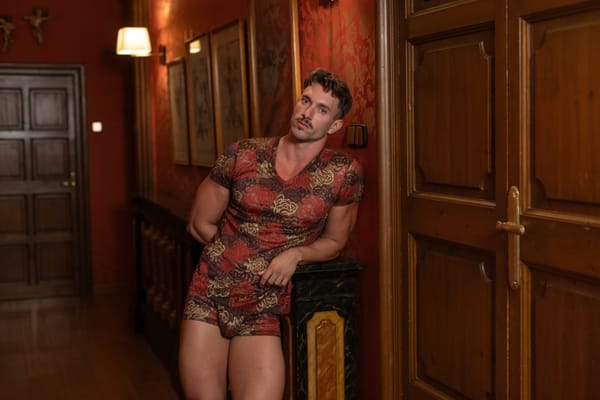Men versus the Manosphere
Hugo Mega deconstructs virility, toxicity, and the power of the patriarchy.

We talk about masculinity a lot, but what does it actually mean? How does masculinity shape our relationships and the way that we navigate the world?
For our podcast, How To Date Men, we caught up with Hugo Mega - a transformative coach and the co-founder of Liminal, a project that focuses on deconstructing masculinity and holding men accountable.
In the conversation, we talk virility, toxicity, and why the manosphere is having a moment.
What does a transformative coach do?
A transformative coach is someone who is there to help you figure some things out. So predominantly is to help you understand how are you actually thinking about things that you want to accomplish. Because sometimes people go to coaching for like, I want to achieve this. And then we go very strategically. Okay, what do need to do? But the transformative coach is more interested on how are you looking at your situation? How are you thinking about it? What are like the limitations and beliefs that are part of it so that you know, your perspective can shift. And from there, there's this like new momentum that makes sustainable change possible in a sense.
I'm curious in like supporting you change and transform your life. But like, how is your life supporting our transformation as a society?
So it's not just about the individual perspective. It's how the individual connects to the broader context?
Yeah, for me it has to be politicized. It has to be included in like this broader system of oppression that we all intersect with and contribute to. So there's no sense without that full broader picture.
You've talked about your interest in gender studies and the politics of that, but it's the concept of masculinity that seems to draw your specific focus. Why is masculinity something that interests you specifically?
I've been at odds with masculinity my whole life. I grew up very effeminate and very androgynous. Up until I was 12, people would still ask me on the streets if I was a boy or a girl. It was a nightmare.
I hated being a boy because it was just like, I just felt like I wasn't one. And people wouldn't see me as one even when I tried to butch myself up. So of course I was bullied and everything. So yeah, I've always felt like I was afraid of men and my father being one of those men I was afraid of.
I had a very artistic background in my studies - as artist and a dancer. So in my early projects, I was already like interested in like deconstructing gender and like, what about gender conditioning? Who are we? Why are we this way? And yeah, and that led me to start therapy and to start questioning gender and realising that there was never anything wrong with my femininity. It was my masculinity that needed my attention, my relationship to patriarchy that needed my attention. And that really was the main game changer of it all and what helped me to then start working with men.
Masculinity is a term that we hear all the time but what does masculinity mean?
From the broad sense of our understanding, masculinity goes to the set of characteristics that we associate with men and boys. And according to how you are understanding gender, you may predominantly anchor that on biology, being that it's like the male chromosomes, the genitalia that you have, the organs that you have, like that amount of hair that you have.
For the most part, it is just determinants of your biology, your physical attributes, but it does not make a gender. Being hairy a man does not make. A penis does not a man make either. So for the most useful understanding of it for me is to understand that gender is a construction and masculinity is a construction of society that has a long history of this construction. We've defined what men were over the ages and we continue doing it over time. And some things have lingered a long time, some things have completely dropped out. For example, pink used to be a color for men to feel powerful because it derived from red and blue was a girl's color. So we've dropped that and then decided that blue was for boys and that became a construction that now we use very beautifully on our gender reveals this like incredible practice that continues to dictate what babies have between their legs defines their genders.
But for me, a more interesting question than what is masculinity and who defines masculinity for me would be like, what is virility and who defines what virility is?
Okay, but what does that mean?
Masculinity and femininity are fluid, right? Anyone can be masculine, anyone can be feminine. We inherently have both qualities we can play with and interact with.
Each culture, each society, each group, each family will dictate what is feminine, what is masculine, basically. So it's very fluid definition. For me, virility is two things. But the most important thing is that it is a measurement tool of one's masculinity. Like your muscular mass, like your thick beard, your square jaw will determine like someone's like virility. And of course, if you have potence or impotence, it will also define your virility.
A great book that defines virility is The Myth of Virility. Unfortunately, it's only in French for the moment. I don't know if it has been translated in English, but it's by Olivia Gazalé for those who read French. And there's podcasts and I'm pretty positive there's a podcast in English out there somewhere.
She shows how virility has been constructed through time with this idea that it has to be measured, it has to be recognized, it has to be counted, it has to be proven. And today, when I study virility, when I look about straight men and how they behave for me, it's all about that. When we are understanding how men relate to violence, to risk taking, to drugs and alcohol consumption. It's all through these competition lenses and all of these measurement lenses. So for me, who defines what is masculinity is the people who are attached to the gender binary and who are using the tool or the lens of virility as a way to measure who is man.
The distinction between virility and masculinity is that virility can be measured?
So virility is a way to establish a hierarchy between men. So then we would go with like, you know, the sociologist Raewyn Connell who defined the four types of masculinity
Virility allows you to also define who are you, where are you, are you men enough or not enough, but then also it's a tool for you to empower yourself because if you are, for example, a marginalized man, like you have a handicap or you're racialized in your society, therefore marginalized, or you belong to a different social class that doesn't have the same privileges as like the most privileged white cis men, heterosexual men, then you can mobilize virile codes in order to gain some privilege and some status and some symbolic status.
But from your perspective, virility is still problematic though, because of the way it creates a hierarchy within masculinity?
There's ways to be virile that are non-harmful and non-oppressive and really like, yeah, it doesn't interfere with anyone's life. But the majority of behaviors that we consider as virile or give meaning to masculinity and to men, they are problematic. So for me, virility is also part of the problem.
How does toxic masculinity cut across here?
Toxic masculinity was a very important term and very useful, especially with the different waves of the #MeToo movement, for us to start categorizing a profile of behaviors and a profile of men that we find problematic. But I think that toxic masculinity has become too mainstream at this point and it becomes a bit meaningless. And within that, there is also this problem, which is we have masculinism and the manosphere that are like going steady and strong, stronger than ever. And they are appropriating toxic masculinity as biology, as power.
So for me, talking in terms of toxic masculinity is no longer so useful. Of course it has its uses and it's important to still use it as a way to like, you know, see what's causing problems. But for me, it would be more interesting to become more specific with the behaviors because talking about toxic masculinity really goes into this dichotomy between good men and bad men, which ultimately just makes the bad men the villains, and the villains is also like a social construction because depending on who you are and where you stand politically, the villain is going to become the migrant people. It's going to be the homeless people, you know, so it has other oppressive systems that intersect with this toxicity. And it also makes that the good guys, those who don't consider themselves toxic, who have toxic behaviors or problematic behaviors, they become passive because they don't see themselves as part of the problem.
So for me, it becomes more important to point out what is it that we find toxic in the behavior of the person. Because being toxic to someone might be that I am not toxic to others, and therefore those who don't see me as toxic and see me as a great person, they will never believe the victims.
And this is how we continue to perpetuate this thing where victims call out their aggressors are toxic. But then we're like, no, they're a great father. They're great partners. They're such great friends. They're great party people. I know them, you know, but we don't know their toxic side.
Talking about the actual behaviors is already like demanding accountability. There's a Confucius quote that I love, which is all wisdom comes from the art of naming things. If we don't name it, then it's a blob. It's ambiguous. People can hide behind it. People can like say it away. But if we go for the facts, facts are facts. And it's demanding immediately accountability, responsibility, reflection upon what people are pointing out to me. So it really holds people more accountable to name the behavior.
You've touched on the concept of the manosphere. I just wonder if you could perhaps talk a little bit more about that because it particularly seems to be a bit of a US phenomenon in terms of the way that this concept of masculinity is being elevated as aspirational and really seems to be setting the conversation in terms of social norms somehow?
It's not a US phenomenon. It may have been the one that had the most visibility, but it's really like a global phenomenon. I feel like it's shocking to me how insidious and everywhere it is. And what we're seeing with our politics today is a beautiful expression of the Manosphere coming to the light, broad daylight, and being proud about it.
And masculinism in the men's sphere, truly are a counter movement, a counter political movement against progress and against feminism, because all that is in common there is that our society and our patriarchal norms are being challenged in question and our moral values of Christianity and the traditional family are being put at risk because of feminist women, queer people, and women in general, basically. So it's a reactive movement against progress, and it's finger pointing and blaming women, basically, and queer people. It's scapegoating women and gender minorities and LGBTQI plus people as creating a problem that actually it's not.
Do you see the emergence of the manosphere - that reaction to progress and feminism and equality - is that the the cause or the the effect? What's driving this emerging as a movement of thought?
It's deriving from privilege being questioned. Patriarchy attributes the most privilege to men, and men have been governing the world very happily. And now that we're demanding equality and the ways of governing the world are being questioned and men are being asked to be held accountable for the damage they're causing to the earth and to the people that live in it. This is all a fight for privilege.
Masculinism is the response, it's the reaction, it's the tools that they get in order to continue to try and validate male dominance and male oppression and male privilege.
How does queerness intersect with all of this?
Judith Butler coined the term that gender is a performance. I feel like us queer people are so privileged to have this capacity to subvert gender, subvert masculine, subvert femininity and empower ourselves with those codes.
Now, when it comes to gay men and queerness and masculinity, I think that, you know, gay men are cis men. So therefore they are privileged men. And to some extent and degree, of course, they will benefit from more or less male privilege. So I do believe that gay men do perpetuate patriarchal masculinity and we're gonna, yeah, mobilize it to our own needs. Meaning that some of us perpetuate virility and masculinity as a survival strategy because it helps us stay safe or not become victimized. Other ones will subvert masculinity, become super femme and super feminine. But also like, you know, it has all of these dynamics of the social economic exchange that comes with virility. Like, I can also use virility in order to uplift my status and, you know, have more sexual context, conquests. And that's such an easy example to go for. But then like, what is it that we're perpetuating? And I find that something that I keep on you know, have this like push and pull relationship with, it's with the idolization that we have of straight men and straightness, right? For me, that's an incredible aspect that I didn't come to terms with, which is like, I'm both appalled by the straight men and attracted to. And I think that's the paradox of being gay sometimes is that, you know, we are excluded by traditional patriarchal masculinity but we are still men and we're still part of it and contribute to it and fighting against it and attracted by it and you know, it's a lot.
How does our understanding or experience of masculinity shape our relationships?
Gender is either a prison or liberation. How attached you may be to the gender binary and the roles that each gender is supposed to be performing, the more you are limiting your life and the spectrum of your experience and the spectrum of your relationships. And this is one of the aspects of how I help people navigate gender through coaching and through therapy. It's really to like understand how are you living by conscious choice in these roles that were attributed to you? Did you choose this? Was this put upon you? Are you perpetuating something that makes you miserable or are you happy and fulfilled in this? Where do you want to be? Is this conscious? Is this unconscious? And are you happy with this? And I think gender and specifically masculinity just really has amputated men from their emotional literacy and emotional intelligence and emotional capabilities. I just feel like men have such a small spectrum of awareness and spaciousness to work with emotions and therefore our relationships are so two-dimensional in that sense.
The NSFW edition
If you want to admire some man-on-man action, our NSFW edition gives you every inch.
Sign in and check out our NSFW content - it's free!










